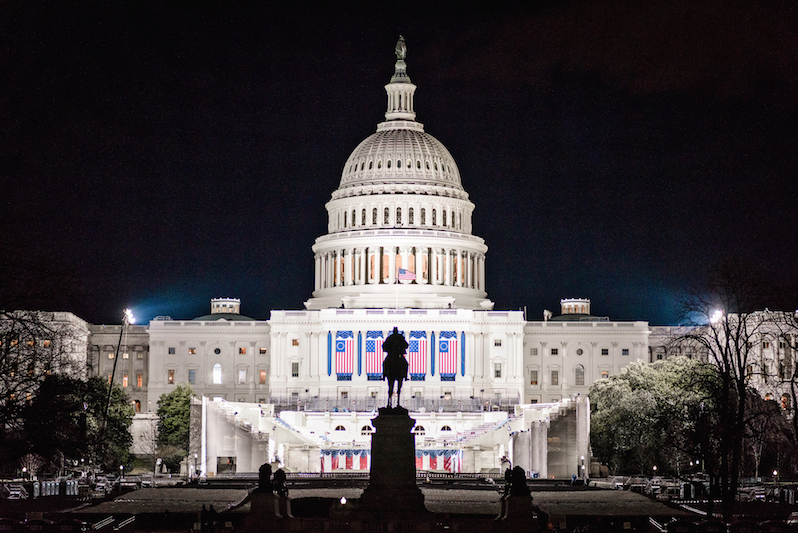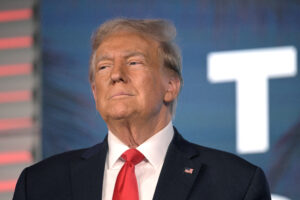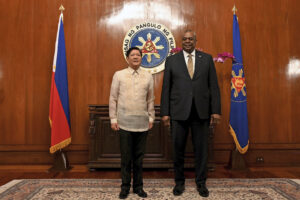The Menace of Trump and the New Authoritarianism: An Interview With Henry Giroux
The renowned intellectual and social activist analyzes the underlying forces of authoritarianism in the U.S. and Europe and argues the need for resistance. The U.S. Capitol readied for the Trump inauguration. (Geoff Livingston / CC 2.0)
1
2
The U.S. Capitol readied for the Trump inauguration. (Geoff Livingston / CC 2.0)
1
2
In your view, what role have educational institutions, such as universities, played in U.S. society?
Ideally, educational institutions, such as higher education, should be understood as democratic public spheres — as spaces in which education enables students to develop a keen sense of economic justice, deepen a sense of moral and political agency, utilize critical analytical skills, and cultivate a civic literacy through which they learn to respect the rights and perspectives of others. In this instance, higher education should exhibit in its policies and practices a responsibility not only to search for the truth regardless of where it may lead, but also to educate students to make authority and power politically and morally accountable, while at the same time sustaining a democratic, formative public culture. Unfortunately, the ideal is at odds with the reality, especially since the 1960s when a wave of student struggles to democratize the university and make it more inclusive mobilized a systemic and coordinated attack on the university as an alleged center of radical and liberal thought. Conservatives began to focus on how to change the mission of the university so as to bring it in line with free-market principles while limiting the admission of minorities. Evidence of such a coordinated attack was obvious in claims by the Trilateral Commission’s report, The Crisis of Democracy, which complained of the excess of democracy and later in the Powell Memo, which claimed that advocates of the free market had to use their power and money to take back higher education from the student radicals and the excesses of democracy. Both reports in different ways made clear that the democratizing tendencies of the sixties had to be curtailed and that conservatives had to mount a defense of the business community by using their wealth and power to put an end to an excess of democracy, especially in those educational institutions which were responsible for “the indoctrination of the young,” which they viewed as a dire threat to capitalism. But the greatest threat to higher education came from the growing ascendency of neoliberalism in the late 1970s, and its assumption of power with the election of Ronald Reagan in the 1980s.
Under the regime of neoliberalism in the United States and in many other countries, many of the problems facing higher education can be linked to eviscerated funding models, the domination of these institutions by market mechanisms, the rise of for-profit colleges, the rise of charter schools, the intrusion of the national security state, and the slow demise of faculty self-governance, all of which make a mockery of the very meaning and mission of the university as a democratic public sphere. With the onslaught of neoliberal austerity measures, the mission of higher education was transformed from educating citizens to training students for the workforce. At the same time, the culture of business has replaced any vestige of democratic governance with faculty reduced to degrading labor practices and students viewed mainly as customers. Rather than enlarge the moral imagination and critical capacities of students, too many universities are now wedded to producing would-be hedge fund managers and depoliticized workers, and creating modes of education that promote a “technically trained docility.” Strapped for money and increasingly defined in the language of corporate culture, many universities are now driven principally by vocational, military and economic considerations while increasingly removing academic knowledge production from democratic values and projects. The ideal of higher education as a place to think, to promote dialogue and to learn how to hold power accountable is viewed as a threat to neoliberal modes of governance. At the same time, education is viewed by the apostles of market fundamentalism as a space for producing profits and educating a supine and fearful labor force that will exhibit the obedience demanded by the corporate order.
You have also written about the need and the possibilities of organizing forces of resistance and change during the Trump presidency. In particular, you have emphasized the importance of expanding the connections among diverse social movements. What are the groups that in your view could work together within the United States?
Single-issue movements have done a great deal to spread the principles of justice, equity and inclusion in the United States, but they often operate in ideological and political silos. The left and progressives as a whole need to unite to create a social movement united in its defense of radical democracy, a rejection of nondemocratic forms of governance, and rejection of the notion that capitalism and democracy are synonymous. There is a need to pull the different elements of the left together so as to both affirm single-issue movements and also recognize their limits when confronting the myriad dimensions of political, economic and social oppression, particularly given how the machinery and rationality of neoliberalism works to now govern all of social life.
It is crucial to recognize that given the hold of neoliberalism on American politics and the move of neofascism from the margins to the center of power, it is crucial for progressives and the left to unite in what John Bellamy Foster has described as their efforts “to create a powerful anti-capitalist movement from below, representing an altogether different solution, aimed at epoch-making structural change.”
What about the old idea of internationalism? Is it better to dedicate efforts to advancing in the national front or trying to build alliances between social movements and political forces from different countries in a longer process? Can both approaches be combined?
There is no outside in politics any longer. Power is global and its effects touch everyone irrespective of national boundaries and local struggles. The threats of nuclear war, environmental destruction, terrorism, the refugee crisis, militarism and the predatory appropriations of resources, profits and capital by the global ruling elite suggests that politics has to be waged on an international level in order to create resistance movements that can learn from and support each other. We need to create a new kind of politics that addresses the global reach of power and the growing potential for both mass destruction and mass global resistance. This does not suggest giving up on local and national politics. On the contrary, it means connecting the dots so that the links between local and state politics can be understood within the logic of wider global forces and the interests that shape them.
Another key idea that you are promoting is that progressive movements must also embrace those who are angry with existing political and economic systems, but who lack a critical frame of reference for understanding the conditions for their anger. Could you sketch out your understanding of a concept that is so important in your work, such as critical pedagogy?
Following theorists, such as Paulo Freire, Antonio Gramsci, C. Wright Mills, Raymond Williams and Cornelius Castoriadis, I have made central to my work the recognition that the crisis of democracy was not only about economic domination or outright repression but also involved the crisis of pedagogy and education. The late Pierre Bourdieu was right when he stated in his book Acts of Resistance that the left has too often “underestimated the symbolic and pedagogical dimensions of struggle and have not always forged appropriate weapons to fight on this front.” He also has stated that “left intellectuals must recognize that the most important forms of domination are not only economic but also intellectual and pedagogical, and lie on the side of belief and persuasion. It is important to recognize that intellectuals bear an enormous responsibility for challenging this form of domination.” These are important pedagogical interventions and imply that critical pedagogy in the broadest sense provides the conditions, ideals and practices necessary for assuming the responsibilities we have as citizens to expose human misery and to eliminate the conditions that produce it.
Pedagogy is about changing consciousness and developing discourses and modes of representations in which people can recognize themselves and their problems. It enables us to invest in a new understanding of both individual and collective struggle. Matters of responsibility, social action and political intervention do not simply develop out of social critique but also forms of self-reflection, critical analysis and communicative engagement. In short, any radical democratic project must incorporate the need for intellectuals and others to address critical pedagogy not only as a mode of educated hope and a crucial element of an insurrectional educational project, but also as a practice that addresses the possibility of interpretation as a form of intervention in the world.
It is crucial to recognize that any viable approach to a democratically inspired politics must embrace the challenge of enabling people to recognize and invest something of themselves in the language, representations, ideology, values and sensibilities used by the left and other progressives. This means taking up the task of making something meaningful in order to make it critical and transformative. Equally important is the need to give people the knowledge and skills to understand how private and everyday troubles connect to wider structures. As Stuart Hall has noted, “You can’t just rest with the underlying structural logic. And so you think about what is likely to awaken identification. There’s no politics without identification. People have to invest something of themselves, something that they recognize is of them or speaks to their condition, and without that moment of recognition … you won’t have a political movement without that moment of identification.”
Critical pedagogy can neither be reduced to a method nor is it nondirective in the manner of a spontaneous conversation with friends over coffee. As public intellectuals, authority must be reconfigured not as a way to stifle the curiosity and deaden the imagination, but as a platform that provides the conditions for students to learn the knowledge, skills, values and social relationships that enhance their capacities to assume authority over the forces that shape their lives both in and out of schools. I have argued for years that critical pedagogy must always be attentive to addressing the democratic potential of how experience, knowledge and power are shaped, both in the classroom and in wider public spheres and cultural apparatuses, extending from the social media and the internet to film culture and the critical and mainstream media. In this sense, critical pedagogy and education itself must become both central to politics and linked to the recovery of historical memory, to the abolition of existing inequities. At stake here is a “hopeful version of democracy where the outcome is a more just, equitable society that works toward the end of oppression and suffering of all.”
We can conclude the interview by looking at the future with some informed optimism. Can you explain the concept of militant hope?
Any confrontation with the current historical moment has to be contoured with a sense of hope and possibility so that intellectuals, artists, workers, educators and young people can imagine otherwise in order to act otherwise. While many countries have become more authoritarian and repressive, there are signs that neoliberalism in its various versions is currently being challenged, especially by young people, and that the social imagination is still alive. The pathologies of neoliberalism are becoming more and more obvious and the contradictions between rule by the few and the imperatives of a liberal democracy have become more jarring and visible. The widespread support for Bernie Sanders, especially among young people, is a hopeful sign as is the fact that many Americans favor progressive programs, such as government-guaranteed health care, social security and higher taxes for the rich.
For resistance not to disappear in the fog of cynicism, the urgency of the present moment demands recognizing that the cruel and harsh reality of a society that finds justice, morality and the truth repugnant has to be repeatedly challenged as an excuse for either a withdrawal from political life or a collapse of faith in the possibility of change. A militant hope should foster a sense of moral outrage and the need to organize with great ferocity. There are no victories without struggles. And while we may be entering a historical moment that has tipped over into an unapologetic authoritarianism, such moments are as hopeful as they are dangerous. The urgency of such moments can galvanize people into a new understanding of the meaning and value of collective political resistance.
What cannot be forgotten is that no society is without resistance, and hope can never be reduced to merely an abstraction. Hope has to be informed, concrete and actionable. Hope in the abstract is not enough. We need a form of militant hope and practice that engages with the forces of authoritarianism on the educational and political fronts so as to become a foundation for what might be called hope in action — that is, a new force of collective resistance and a vehicle for anger transformed into collective struggle, a principle for making despair unconvincing and struggle possible. Nothing will change unless people begin to take seriously the deeply rooted cultural and subjective underpinnings of oppression in the United States and what it might require to make such issues meaningful in both personal and collective ways, in order to make them critical and transformative. This is fundamentally a pedagogical as well as a political concern. As Charles Derber has expressed to me, knowing “how to express possibilities and convey them authentically and persuasively seems crucially important” if any viable notion of resistance is to take place.
Your support matters…
SUPPORT TRUTHDIG
Independent journalism is under threat and overshadowed by heavily funded mainstream media.
You can help level the playing field. Become a member.
Your tax-deductible contribution keeps us digging beneath the headlines to give you thought-provoking, investigative reporting and analysis that unearths what's really happening- without compromise.
Give today to support our courageous, independent journalists.






You need to be a supporter to comment.
There are currently no responses to this article.
Be the first to respond.